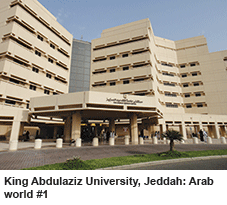Saudi Arabia: Surprising academic progress
 It may not be quite the country for the usual university experience: moving out of home; experimenting; dating. Nor does it have Egypt’s long history of scholarship, with the likes of the Al Azhar University, reputed since the 10th century. But Saudi Arabia is gaining an unlikely reputation for learning in the Middle East. Earlier this year, it won three of the top four spots in an annual ranking of Arab universities by Times Higher Education. Topping the chart was King Abdulaziz University in the western city of Jeddah, which was founded in 1967.
It may not be quite the country for the usual university experience: moving out of home; experimenting; dating. Nor does it have Egypt’s long history of scholarship, with the likes of the Al Azhar University, reputed since the 10th century. But Saudi Arabia is gaining an unlikely reputation for learning in the Middle East. Earlier this year, it won three of the top four spots in an annual ranking of Arab universities by Times Higher Education. Topping the chart was King Abdulaziz University in the western city of Jeddah, which was founded in 1967.
The kingdom rarely pulls things off as well as, let alone better than, its more savvy fellow Gulf states. But in higher education, it has steamed ahead. One reason is that many Saudis have long gone to study in Europe and America. Some return with top-notch degrees and go into academic teaching. In recent years the kingdom has also had the cash to attract foreign academics on the promise they can conduct research. That has paid off with an increasing number of mentions in academic journals, which is one of the indicators used by THE.
Less surprising is the American University of Beirut’s romp into second place. It is one of a handful of private campuses in the region that dates back to colonial times; after independence, large state-run institutions became the norm. It has long been seen as the region’s university of choice — and not only for the quality of its education, which is conducted in English. Its beautiful, green campus rolls down to the sea in liberal Beirut, where something more akin to the Western freewheeling student experience is on offer. Other Gulf universities and three Egyptian institutions fill the next slots in the Top 15; Jordan and Morocco sneak in near the bottom. The war-torn states of Syria and Yemen are, unsurprisingly, absent.
But by world standards, Arab universities don’t offer students a good deal. King Abdulaziz only just made it into the global Top 300. Teaching in the Arab world tends to emphasise rote learning rather than developing analytical skills. Facilities often lack the latest technology. Jaidaa Hamada, a lecturer in English at Egypt’s University of Alexandria, thinks the main problem is the huge number of students, assigned to subjects not according to their own choice, but to their school grades. Medicine, engineering and political science require high results. Low-scorers are concentrated in arts, business and education courses. The very wealthy send their sons and daughters abroad. Many never come back, contributing to a brain drain in the Arab world.
In one unexpected way however, Arab institutions are making rapid progress. Women now outnumber men in half of the Top 15 Arab universities. King Abdulaziz’s student body has 57 female students for every 43 males. Sadly, female graduates aren’t joining the workforce in the same numbers as their male peers.















Add comment